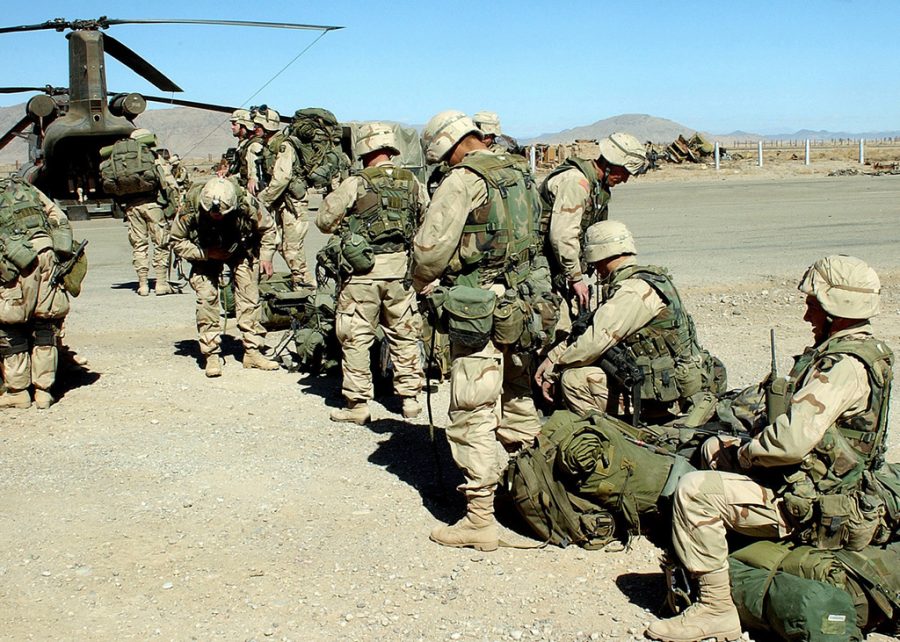Biden to End US Military Presence in Afghanistan
Nearly All Troops Home by September 11, 2021
SSGT_DERRICK_C._GOODE,_USAF from US National Archives
Soldiers from the 101st Airborne Division (Air Assault), 3rd Brigade, Fort Campbell, Kentucky, prepare to enter a CH-47 Chinook helicopter.
On April 14, President Biden announced the withdrawal of all U.S. soldiers from Afghanistan by September 11, effectively ending America’s longest war and eliciting both praise and criticism. While officials on both sides of the aisle are relieved that soldiers are finally coming home from a largely unproductive conflict, others believe that the threat of a resurgent Taliban regime is simply too great.
In 1994, US-backed Islamist fighters formed the Taliban and rose to dominate Afghanistan after a proxy war between America and Russia destabilized the nation. The Taliban enforced a theocratic regime, banning women from employment, secular education, and public life. Forced marriages and extrajudicial killings skyrocketed, and over one million Afghans fled the nation. American tensions with the Taliban and another terror group, al-Qaeda, deteriorated during the ’90s, and 9/11 provoked near-unanimous support for retaliation. Weeks after al-Qaeda hijackers crashed commercial airplanes into the World Trade Center, the U.S. rushed into Afghanistan, urged on by President Bush’s announcement of the War on Terror and the Taliban’s protection of al-Qaeda leader Osama bin Laden. The mission was initially successful, and American troops forced the Taliban to near-dissolution in a matter of weeks, working with the Afghan military to target terrorists and instating a stable, if fragile, democracy.
In 2003, the U.S. turned to Iraq, and the Taliban began to rebuild and launch counterattacks. In the coming decade, they recruited in greater numbers, exploiting mistrust and hatred of the American military to fill their ranks. Meanwhile, the purpose of keeping American troops in the region became increasingly unclear, especially after a separate group of Navy SEALs killed bin Laden in Pakistan. Douglas Lute, a high-ranking Army general who helped oversee military efforts under both Bush and Obama, reported that “We were devoid of a fundamental understanding of Afghanistan — we didn’t know what we were doing.” But after nineteen years of occupation, the U.S. was an essential component of Afghan military operations, and the ramifications of pulling out were so prolific that Bush, Obama, and Trump all chose to remain in Afghanistan during their presidencies.
Now, after years of fighting, Biden has announced that all of our troops will be gone by the 20th anniversary of 9/11, although America will maintain a military presence in the surrounding regions and continue to fund Afghan counterterrorism efforts. President Trump made a similar deal, promising to remove all soldiers by May 1, 2021, but his commitment relied on the Taliban breaking from al-Qaeda and reducing their violent streak, neither of which happened. Biden’s agreement, on the other hand, is unconditional. It also extends the deadline, a change that Trump has criticized but military officials have deemed more achievable and fairer to our Afghan allies. According to former defense secretary Chuck Hagel on CNN, “I think his date was the right decision.” Hagal also spoke to the Hill, asserting that “We will have to leave… but it has to be done responsibly.” Many share his opinion that the withdrawal is a tough but necessary step to protect soldiers and untangle our country from a long and destructive war.
However, some people believe that retreating is too dangerous; even Biden officials recognize the likelihood of a Taliban resurgence in the wake of the military’s departure. Aside from fears regarding America’s safety, the absence of U.S. soldiers poses an urgent threat to Afghans, many of whom feel abandoned. A farmer displaced by conflict told the New York Times that “the Americans are responsible for the troubles, [the] hardships that we are going through. Now they are going to leave with their troops, with no peace, no progress.” Feminist activists worry that strides made during the U.S. occupation will disintegrate under the Taliban, leaving women dehumanized once again. Withdrawal supporters counter these fears with the Taliban’s desire for recognition. According to Secretary of State Antony Blinken, “if it wants to be internationally recognized, it doesn’t want to be a pariah.” He argues that the group will try to come to power democratically and that they may soften their Islamist-fundamentalist beliefs in order to receive foreign aid after years of war. Critics have said that this idea is naïve and that the Taliban’s incentives to be civil will disappear the moment the final American soldier leaves.
Regardless of how strong the terrorist surge is, Afghan civilians will undoubtedly be the first to suffer. This conflict has forced the U.S. to reckon with the long-term impacts of destabilizing nations and to reconsider its role in international crises. Because whatever that role is, the “Forever War” proved that America needs to know before it sends in the troops.







